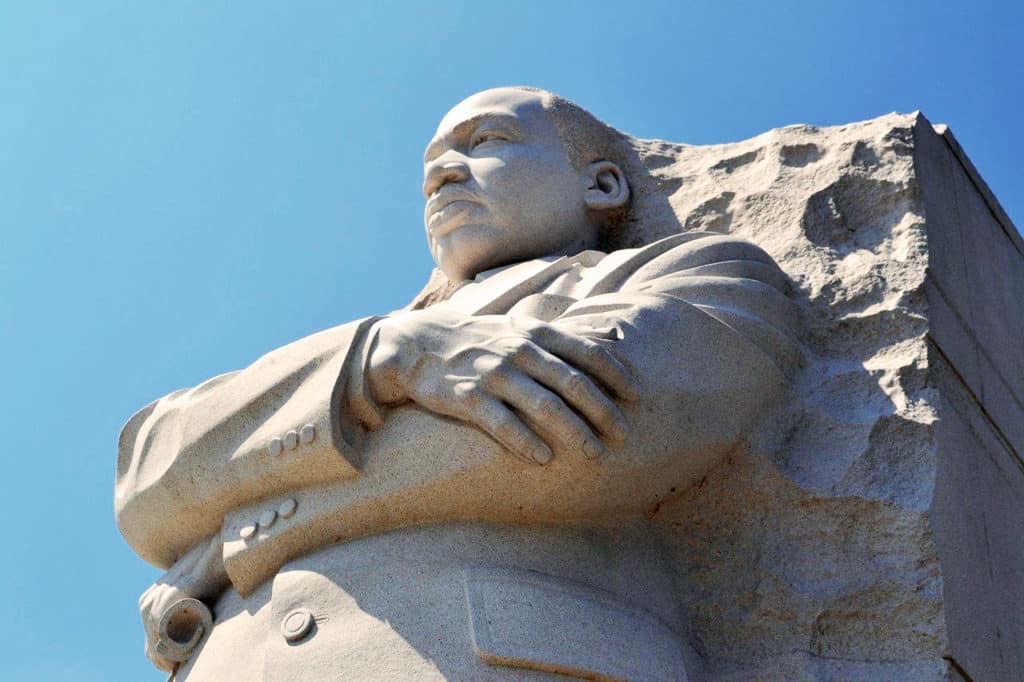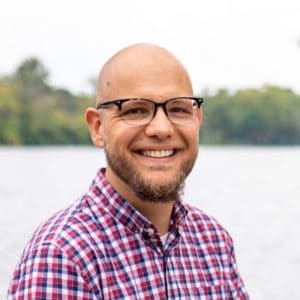(This piece was adapted from an earlier essay published by The Center for Social Concerns at The University of Notre Dame. https://socialconcerns.nd.edu/department-blogs/cst)
“We shall overcome because the arc of the moral universe is long but it bends towards justice.”1
These words of Dr. King are some of his most often quoted and elicit inspiration, both because of the imagery they invoke and because of the life lived by the man who spoke them. They are, however, in these more cynical days, open to critique and commentary from those who would, on all accounts, align themselves with Dr. King’s vision of a world saturated by peace and justice. One could read this and assume that Dr. King is a person who sees the world made right as a foregone conclusion, an inevitability based on a naive notion of the human spirit and our innate capacity for good. Eventually, we will become enlightened enough that the world will just be good, right, and true and people will eventually all be free from whatever chains bind them.
Critics could point out that this supposed inevitability of justice is foolish in the sense that very little evidence exists to support this claim. And they would, of course, be correct. There is very little tangible proof that the world is moving itself toward justice. Believing that humanity is progressing toward justice is a massive misreading of history, a shallow understanding of theology, and a superficial vision of justice.
So either Dr. King misunderstands justice, or today’s commentators misunderstand him.
I believe it is the latter.
The Prophets of the Christian tradition had a very specific vocation in the work of justice: to imagine or envision the world that God not only desires but has pledged to bring into existence one day and to invite the people to live now in light of that future reality.
This is because Dr. King is doing something unintelligible to many who come to the work of justice from a different place than him. Dr. King was a justice leader in the Christian prophetic tradition. The Prophets of the Christian tradition had a very specific vocation in the work of justice: to imagine or envision the world that God not only desires but has pledged to bring into existence one day and to invite the people to live now in light of that future reality. In Scripture, the Old Testament prophets, such as Isaiah and Micah, were masters of articulating a future when the world would be marked by the justice and peace of YHWH and then calling the people (Ancient Israel in this case) to align their communal and private actions with such a vision.2
The Prophet played an important role among the people. By holding out a picture of a just and peaceful tomorrow, the people could work out their future hope in their everyday lives.
This is, ultimately, the vocation of the people of God and one of the reasons why justice is so intertwined with what it means to be faithful to that vocation. Justo Gonzalez helpfully calls the church a mañana people, nurturing a way of life nourished by a vision of God’s tomorrow by advocating for justice “as long as it is called today.”3 This doesn’t lull the people to sleep with empty promises of liberation. Instead, the prophetic vision of prophets and justice leaders throughout history nurtures and strengthens the imagination of the people in a way that allows them to bear up under the burden of their toil and trials. The prophetic vision creates an opportunity for resilience. Theologically speaking, resilience is eschatological because God’s future is informing the present in tangible ways.
This is, I believe, what Dr. King was doing. His faith drank deep from the well of the prophetic tradition and the pastoral leadership role was inextricably intertwined from the role of prophetic leader. Dr. King wasn’t arguing that the world will eventually become just. He was offering the people (black people in America in particular) a vision of God’s preferred and promised future, and doing so in a way that allowed them to wake up each day and bear up under the strain of Jim Crow racists, structural injustice and the ambivalence of everyday Americans. He was inviting black America to live out a kind of eschatological resilience–one that wasn’t swayed by the circumstances of a particular day but one that was watered by the well of the Christian prophetic tradition.
Why else would he–quoting Amos–suggest that justice will “roll down like waters and righteousness like a mighty stream”?4 His imagination for justice and peace was so saturated in God’s vision for justice and peace that he could sustain the work of casting that same vision out for the people in order to cultivate their capacity to sustain themselves through the struggle. The world is not going to just eventually become just. God will, however, make it so someday, and it is that fact that gives birth to resilience for people under the thumb of oppression, injustice and calamity. When he calls to the people “How long? Not long!”5 we see him acting out the vocation of the Prophet; wooing the people toward God’s promised tomorrow; not so they would passively accept their current fate, but so that they could orient and nourish their pursuit of that just future, today.
We live in wearying times. I experience constant low-grade anxiety (which escalates often!) due to Covid-19. I tire of political infighting, even as I worry if the chaos of electoral politics might actually be just what our elected leaders want; an intentional distraction from the vast injustice and violence championed by their anti-human policies and rhetoric. These are the additional stressors that exacerbate the daily struggle of so many, the plight of the poor and the bruises of those beaten down by a society governed by unholy self-interest. It can often seem too much, and it elicits a deep compassion for those who experience the darker side of society and for those who give their life and work and love to nurturing ways for everyone to flourish.
Truly, this a time for resilient people who know that Thomas Merton was right when he said “Christian hope begins where every other hope stands frozen stiff before the face of the Unspeakable.”6
The vocation of the Prophet is to woo the people toward God’s promised tomorrow, not so they would passively accept their current fate, but so that they could orient and nourish their pursuit of that just future, today.
So, how do we nurture resilience in uncertain times or unjust situations? We have an option available to us that was modeled well by Dr. King. We can give space in our imagination for the prophetic tradition and the visions of God’s just and peace-filled future. We can reflect on the disparity between the day when all will be good, right, and true and our current reality, and imagine together what it could mean to inhabit God’s future today. A harder reality to embrace, to be sure. But such is the work of living into, and out of, the peace of God in a violent world. Embodying our hope that God will set the world right feeds our capacity to be resilient. Scores of oppressed peoples around the world and over time have demonstrated that to us.
What other option do we have? After all, it may not seem like it, but the arc of the moral universe is long and it bends toward justice. And that ought to mean something for us today.
Notes
1 Dr. Martin Luther King, Jr. “Remaining Awake through a Great Revolution.” March 31, 1968.
2 John’s Revelation includes very similar imagery in the New Testament, extending the character of the prophetic tradition beyond Ancient Israel.
3 Justo Gonzalez, Mañana: Christian Theology from a Hispanic Perspective (Nashville: Abingdon Press, 1990). For a lengthier treatment of the eschatological nature of an ecclesiology that does justice, see Adam Gustine, Becoming a Just Church: Cultivating Communities of God’s Shalom (Downers Grove: Intervarsity Press, 2019), specifically chapter 3: ‘Demonstrating Mañana’ (pp. 55-75).
4 Amos 5:24.
5 Speech delivered in Montgomery, AL. March 25, 1965.
6 Thomas Merton, Raids on the Unspeakable (New York: New Directions, 1966), 5.

